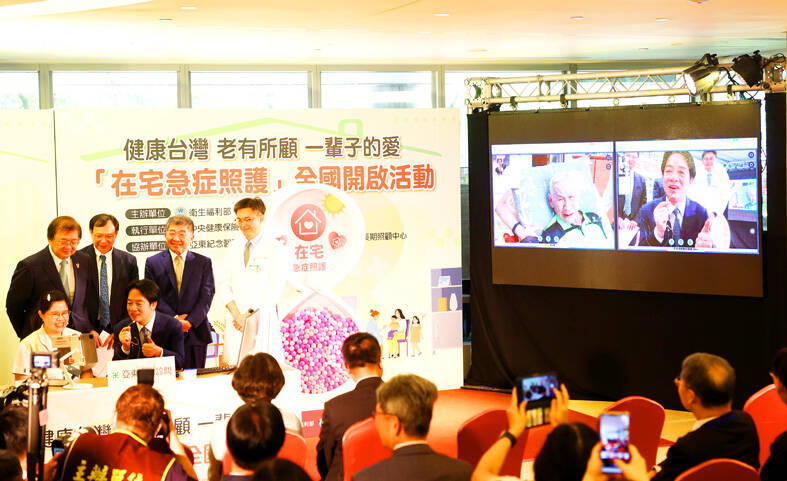President William Lai (賴清德) yesterday visited a hospital to oversee implementation of the “acute care at home” trial program after amendments to the Rules of Medical Diagnosis and Treatment by Telecommunications (通訊診察治療辦法) aimed at expanding telemedicine services took effect on Monday.
The amendments added five new categories of people eligible for telemedicine: those in a chronic care program, under hospice care, in correctional institutions or under disability care, or those receiving treatment for an illness or injury sustained in a disaster, an infectious disease or for other major incidents.
The pre-existing five categories of eligible people were those receiving post-acute care, long-term care, international medical care or home-based medical care, or people who have been admitted by a family doctor.

Photo: CNA
In all cases, they must either have received approval from the local health department or be included in the National Health Insurance bundled payment programs.
Lai yesterday visited Far Eastern Memorial Hospital (亞東醫院) in New Taipei City’s Banciao District (板橋) to observe the implementation of the new program.
Minister of Health and Welfare Chiu Tai-yuan (邱泰源) said Taiwan would become a super-aged society next year, meaning people aged 65 or older would account for more than 20 percent of the population.
The acute care at home trial program is expected to alleviate the burden caregivers face of having to take elderly patients to and from hospitals, by linking long-term care resources and bringing medical care to people at their homes or care facilities, Chiu said.
Lai, formerly a physician, said that when he was a resident doctor, some bedridden patients were brought by their family members to see him.
He said he also grew up in a remote township with limited medical resources, where doctors would send people medicine or voluntarily conduct free consultations.
That is why he wants to promote home-based healthcare services, Lai said.
The expansion of telemedicine services and the launch of the trial program can be seen as a milestone for Taiwan’s healthcare services, Lai said.
As technology advances, Taiwan must apply it to healthcare services to benefit the public, he added.
Demonstrating the telemedicine service, a nurse held a teleconsultation with a bedridden patient nicknamed Ah Hua (阿華). Lai stood to the side as a doctor encouraged Ah Hua to sit up and try to walk more often.
The program has teams of doctors, nurses, pharmacists and respiratory therapists providing integrated care to people who need antibiotic treatment for pneumonia, urinary tract infections or soft tissue infections, National Health Insurance Administration Director-General Shih Chung-liang (石崇良) said.
The patients can choose to be hospitalized or to receive home-based care using telemedicine, equipment to remotely monitor their vital signs and bedside testing, which would enable them to rest at home while receiving treatment, he said.
The trial program is expected to benefit about 5,400 people, he added.

‘CHARM OFFENSIVE’: Beijing has been sending senior Chinese officials to Okinawa as part of efforts to influence public opinion against the US, the ‘Telegraph’ reported Beijing is believed to be sowing divisions in Japan’s Okinawa Prefecture to better facilitate an invasion of Taiwan, British newspaper the Telegraph reported on Saturday. Less than 750km from Taiwan, Okinawa hosts nearly 30,000 US troops who would likely “play a pivotal role should Beijing order the invasion of Taiwan,” it wrote. To prevent US intervention in an invasion, China is carrying out a “silent invasion” of Okinawa by stoking the flames of discontent among locals toward the US presence in the prefecture, it said. Beijing is also allegedly funding separatists in the region, including Chosuke Yara, the head of the Ryukyu Independence

UNITED: The premier said Trump’s tariff comments provided a great opportunity for the private and public sectors to come together to maintain the nation’s chip advantage The government is considering ways to assist the nation’s semiconductor industry or hosting collaborative projects with the private sector after US President Donald Trump threatened to impose a 100 percent tariff on chips exported to the US, Premier Cho Jung-tai (卓榮泰) said yesterday. Trump on Monday told Republican members of the US Congress about plans to impose sweeping tariffs on semiconductors, steel, aluminum, copper and pharmaceuticals “in the very near future.” “It’s time for the United States to return to the system that made us richer and more powerful than ever before,” Trump said at the Republican Issues Conference in Miami, Florida. “They

GOLDEN OPPORTUNITY: Taiwan must capitalize on the shock waves DeepSeek has sent through US markets to show it is a tech partner of Washington, a researcher said China’s reported breakthrough in artificial intelligence (AI) would prompt the US to seek a stronger alliance with Taiwan and Japan to secure its technological superiority, a Taiwanese researcher said yesterday. The launch of low-cost AI model DeepSeek (深度求索) on Monday sent US tech stocks tumbling, with chipmaker Nvidia Corp losing 16 percent of its value and the NASDAQ falling 612.46 points, or 3.07 percent, to close at 19,341.84 points. On the same day, the Philadelphia Stock Exchange Semiconductor Sector index dropped 488.7 points, or 9.15 percent, to close at 4,853.24 points. The launch of the Chinese chatbot proves that a competitor can

‘VERY SHALLOW’: The center of Saturday’s quake in Tainan’s Dongshan District hit at a depth of 7.7km, while yesterday’s in Nansai was at a depth of 8.1km, the CWA said Two magnitude 5.7 earthquakes that struck on Saturday night and yesterday morning were aftershocks triggered by a magnitude 6.4 quake on Tuesday last week, a seismologist said, adding that the epicenters of the aftershocks are moving westward. Saturday and yesterday’s earthquakes occurred as people were preparing for the Lunar New Year holiday this week. As of 10am yesterday, the Central Weather Administration (CWA) recorded 110 aftershocks from last week’s main earthquake, including six magnitude 5 to 6 quakes and 32 magnitude 4 to 5 tremors. Seventy-one of the earthquakes were smaller than magnitude 4. Thirty-one of the aftershocks were felt nationwide, while 79